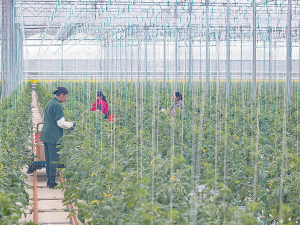Hothouse trial hoping to slash plastic twine use
Vegetable grower NZ Hothouse Ltd has always been ahead of the game when it comes to sustainability, but new innovations are coming thick and fast.
 NZ Hothouse Ltd is the country’s largest privately-owned tomato grower, it has 19.5ha of glasshouses in Karaka, south Auckland, and produces more than 18 million units per annum.
NZ Hothouse Ltd is the country’s largest privately-owned tomato grower, it has 19.5ha of glasshouses in Karaka, south Auckland, and produces more than 18 million units per annum.
NZ Hothouse Ltd's managing director Simon Watson reckons if you want to make something expensive, difficult and clumsy you get a bureaucrat in Wellington to do it – referring to labour shortages and worker visa settings.
His company, which is New Zealand’s largest privately-owned tomato grower, has 19.5ha of glasshouses in Karaka, Auckland and produces more than 18 million units per annum – a unit being a kilo of tomatoes, a punnet of cherry tomatoes or a telegraph cucumber.
Watson says the company produces about 25% of the country’s tomatoes. They are not the biggest producer in New Zealand – that is Status Produce, also in Auckland – but they are the biggest privately owned one.
The majority of its business is with the two major supermarket chains, providing the whole range of tomatoes, but its specialist area is cherry tomatoes. NZ Hothouse has always been in the glasshouse business and founder Brett Wharfe originally opened a packhouse in the early 1980s and he initially had a number of other growers – up to 120 growers at the peak – supplying the packhouse.
“The reason for that was the supermarkets wanted consistency; they wanted to be able to place an order for 1,000 cartons and know they were all the same colour, shape, size and quality. You can only do that through a packhouse,” says Watson.
In the late ‘90s, following a trip to Europe Watson – who joined the company in the early ‘90s – says they found that growers there were getting larger, there were less of them and they were getting more corporatised.
“We came back from that trip and Brett built 5ha of the glasshouses we have today. If you go back 30 years ago tomato in the New Zealand there were over 1,000 growers. Today there are about 100.”
Of those 100 about six currently make up about 80% of the industry.
The business got into hydroponics in the late ‘90s. A focus for the company is biological methods.
“We avoid using agrichemicals and we introduce beneficial insects to hunt out and destroy the bad insects,” says Watson. “That minimises the amount of agrichemicals we have to spray.” He says it is an ongoing battle.
“As an industry we would love to have more beneficial insects in our toolbox. And there are number of research projects we are involved with to try and identify some of the native species to have more beneficial insects available to us,” Watson told Hort News.
He says Whitefly is the major problem insect and they need to find predator insects that like to eat it.
“And they also need to like tomatoes and not all insects like tomatoes. The major one used at the moment is Encarsia Formosa. That is a very tiny wasp that lays its larvae in the larvae of a white fly.”
They use bumble bees to pollinate “which is the way nature intended”.
“In our major glasshouse we have about 25,000 in various hives dotted around the glasshouse at any one time."
But like many in horticulture, the last couple of years have been tough and getting tougher.
Over the last two years, only about 3% of their crop has been exported because of Covid and the disruption to shipping schedules both in and out of NZ means a lot of export has been shelved.
Watson says their three major costs are labour, energy and fertiliser.
“Those are our three biggest costs. Labour has gone up 18% in the last 18 months, natural gas has gone up 49% and fertiliser has gone up 81%.”
The fertiliser one may settle down because that is very much a function of disrupted supply lines, he says.
“But in general, it has been a perfect storm, we’ve had the issues with Covid, we’ve had the disruptions to shipping supply lines and on top of that we have had spikes in energy prices caused by the activities in places like Ukraine.
“You throw into that we are desperately short of labour, the borders have been shut and the immigration pathways provided by Wellington have been very disruptive.”
Controls on the movement of fruit and vegetables in the Auckland suburb of Mt Roskill have been lifted.
Fonterra farmer shareholders and unit holders are in line for another payment in April.
Farmers are being encouraged to take a closer look at the refrigerants running inside their on-farm systems, as international and domestic pressure continues to build on high global warming potential (GWP) 400-series refrigerants.
As expected, Fonterra has lifted its 2025-26 forecast farmgate milk price mid-point to $9.50/kgMS.
Bovonic says a return on investment study has found its automated mastitis detection technology, QuadSense, is delivering financial, labour, and animal-health benefits on New Zealand dairy farms worth an estimated $29,547 per season.
Pāmu has welcomed ten new apprentices into its 2026 intake, marking the second year of a scheme designed to equip the next generation of farmers with the skills, knowledge, and experience needed for a thriving career in agriculture.

OPINION: Here w go: the election date is set for November 7 and the politicians are out of the gate…
OPINION: ECan data was released a few days ago showing Canterbury farmers have made “giant strides on environmental performance”.